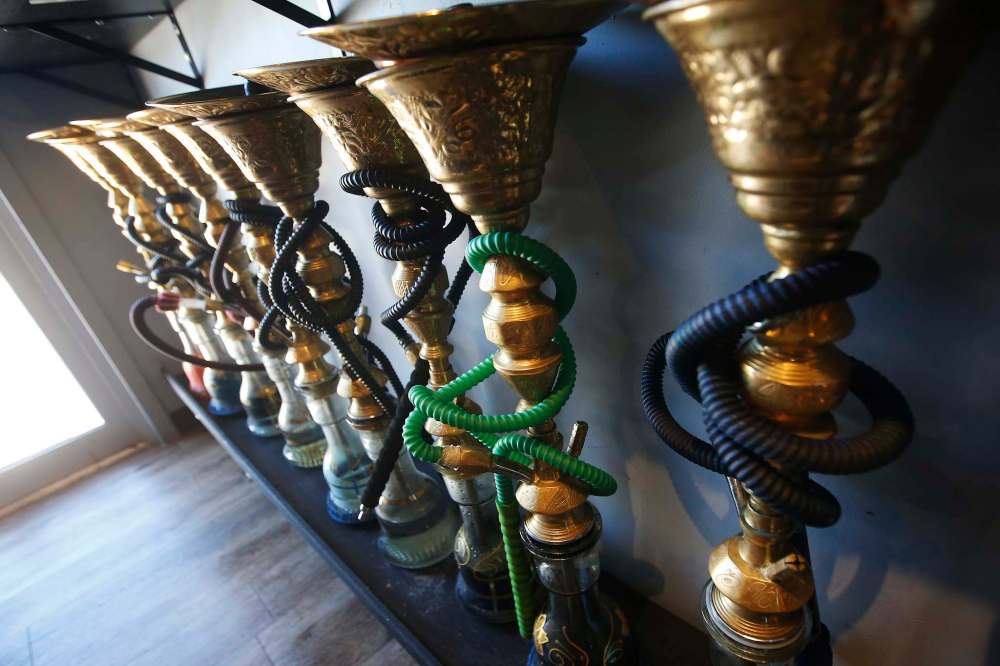Time for Manitoba to extinguish hookah
Advertisement
Read this article for free:
or
Already have an account? Log in here »
To continue reading, please subscribe:
Monthly Digital Subscription
$0 for the first 4 weeks*
- Enjoy unlimited reading on winnipegfreepress.com
- Read the E-Edition, our digital replica newspaper
- Access News Break, our award-winning app
- Play interactive puzzles
*No charge for 4 weeks then price increases to the regular rate of $19.00 plus GST every four weeks. Offer available to new and qualified returning subscribers only. Cancel any time.
Monthly Digital Subscription
$4.75/week*
- Enjoy unlimited reading on winnipegfreepress.com
- Read the E-Edition, our digital replica newspaper
- Access News Break, our award-winning app
- Play interactive puzzles
*Billed as $19 plus GST every four weeks. Cancel any time.
To continue reading, please subscribe:
Add Free Press access to your Brandon Sun subscription for only an additional
$1 for the first 4 weeks*
*Your next subscription payment will increase by $1.00 and you will be charged $16.99 plus GST for four weeks. After four weeks, your payment will increase to $23.99 plus GST every four weeks.
Read unlimited articles for free today:
or
Already have an account? Log in here »
Hey there, time traveller!
This article was published 07/10/2020 (1896 days ago), so information in it may no longer be current.
HOOKAH has come into the market in Winnipeg and has been shown to be appealing to youth and new users. The temporary ban on serving hookah in public places is an opportunity to close an existing loophole in legislation and put a permanent ban in place, consistent with all forms of smoking.
While tobacco-control measures have successfully reduced the incidence rates of smoking over the past few decades, there are new unregulated smoking-type products undermining our progress. We would like to bring to the attention of Manitobans that, COVID-19 transmission risk notwithstanding, the health effects of hookah smoking are significant.
For those unfamiliar with hookah use, it is also referred to as shisha, narghile, waterpipe, or hubbly-bubbly. It is a form of smoking via a common instrument used for smoking tobacco or other substances. The smoked material is often called shisha and can be flavoured. The shisha is burned by applying a lit charcoal or a briquet. The resulting smoke passes through a water reservoir and is inhaled through a tube and mouthpiece. There are usually several tubes per hookah, so a number of people can use the hookah at the same time and socialize.

Thirty-eight percent of students in Grades 9 to 12 consider hookah use to be less harmful than cigarette smoking, even though hookah use, as a study shows, is linked to many of the same adverse health effects, such as lung and cardiovascular disease. Use of hookah is gaining broader popularity in the younger generation due to the variety of flavours, affordability, social nature and accessibility of the product.
As with smoking cigarettes and vaping, exposure to hookah smoke can cause serious health effects, whether tobacco is in the shisha or not. According to the WHO 2005 Study Group on Tobacco Product Regulation, “Shisha smokers in comparison to cigarette smokers would inhale an equivalent of 100 or more cigarettes in one session.”
Studies have shown that some shisha is incorrectly and deceivingly labeled tobacco free. Evidence indicates even so-called tobacco free “herbal” shisha can be harmful, regardless of the presence of nicotine. A study in Alberta found high levels of lead, chromium, nickel, arsenic and polycyclic aromatic hydrocarbons in herbal shisha.
These toxic trace metals and carcinogens were found in equivalent or greater concentrations than in tobacco shisha. Acute carbon monoxide toxicity from the burning charcoal can result in nausea, dizziness and difficulty breathing, and extended exposure can cause heart attack, cerebral edema, coma or death.
Furthermore, the air quality in hookah lounges has been shown to have high levels of fine particulate air pollution. Customers and employees are exposed to second-hand hookah smoke, even bringing the smoke home on their clothes and skin, contributing to “third hand” exposure to family.
Five Canadian provinces — Quebec, New Brunswick, Nova Scotia, Prince Edward Island, and Newfoundland and Labrador — currently prohibit smoking of all hookah products, including herbal non-tobacco shisha, in all places where smoking is banned. At the municipal level, major Canadian cities — Toronto, Vancouver, and Edmonton — have all amended their indoor smoking bans to include hookah smoke.
In Winnipeg and in Manitoba, neither the provincial smoking ban nor the City of Winnipeg By-law No. 62/2011 encompass shisha smoking in public places. Restrictions on hookah use, combined with public education to accompany the regulatory change, are needed to protect public health and hospitality worker health.
In Winnipeg and provincially, hookah smoking in public establishments can occur due to loopholes in our legislation. We need to amend the definition of smoking within the regulations to include hookah to protect the health of the public and hospitality workers.
Maryam Al-Azazi concludes, “As an immigrant myself, I grew up in an environment that normalized the behaviour of hookah use. I have a deep understanding and I sympathize with the complexity of the culture intertwining with this practice. I have purposefully undertaken research on this topic as I am worried about the short- and long-term effect of smoking hookah. Understanding the cultural history of hookah and the medical science outlining the significant health risks of hookah use, I ask myself, ‘Is this risk worthwhile?’”
Maryam Al-Azazi and Neil Johnston are registered respiratory therapists and are associated with theThe Lung Association, Manitoba. Contributors and signatories to this article include: John McDonald, executive director of the Manitoba Tobacco Reduction Alliance; Brittany Curtis, policy specialist with Action on Smoking and Health; and Amanda Nash, health promotion manager with the Heart and Stroke Foundation.


